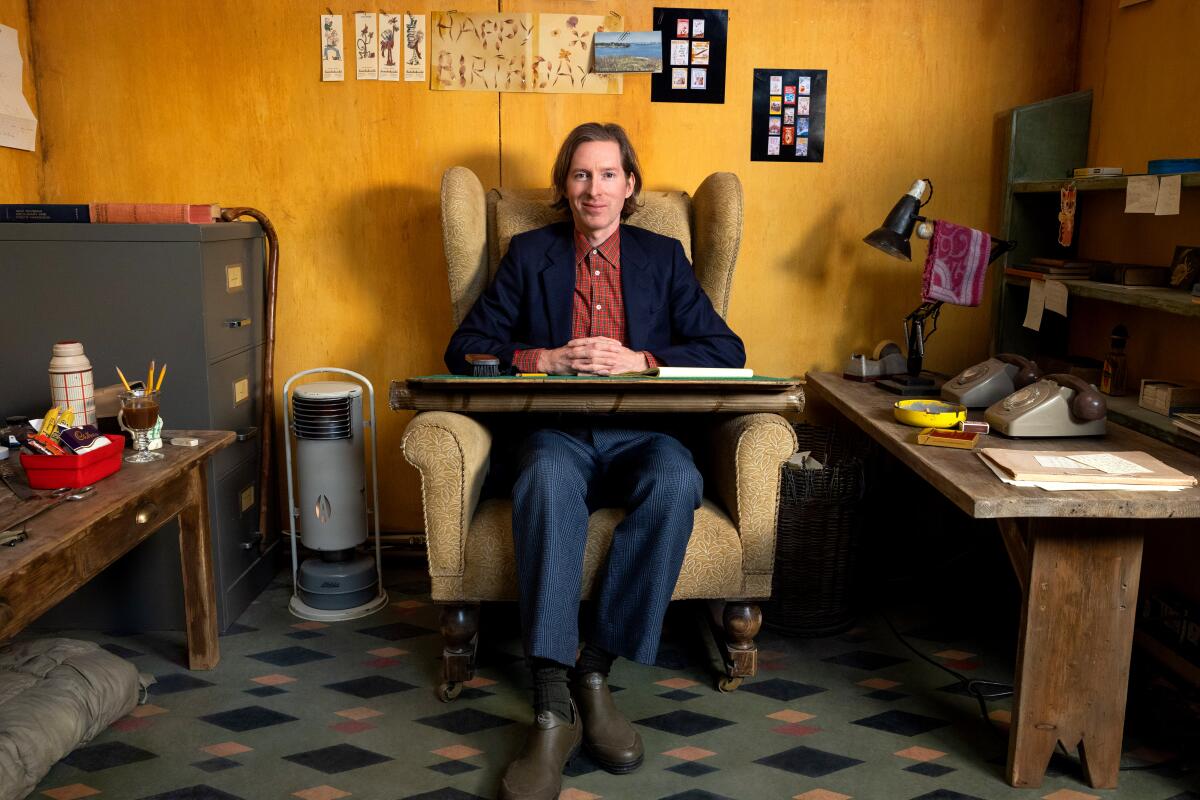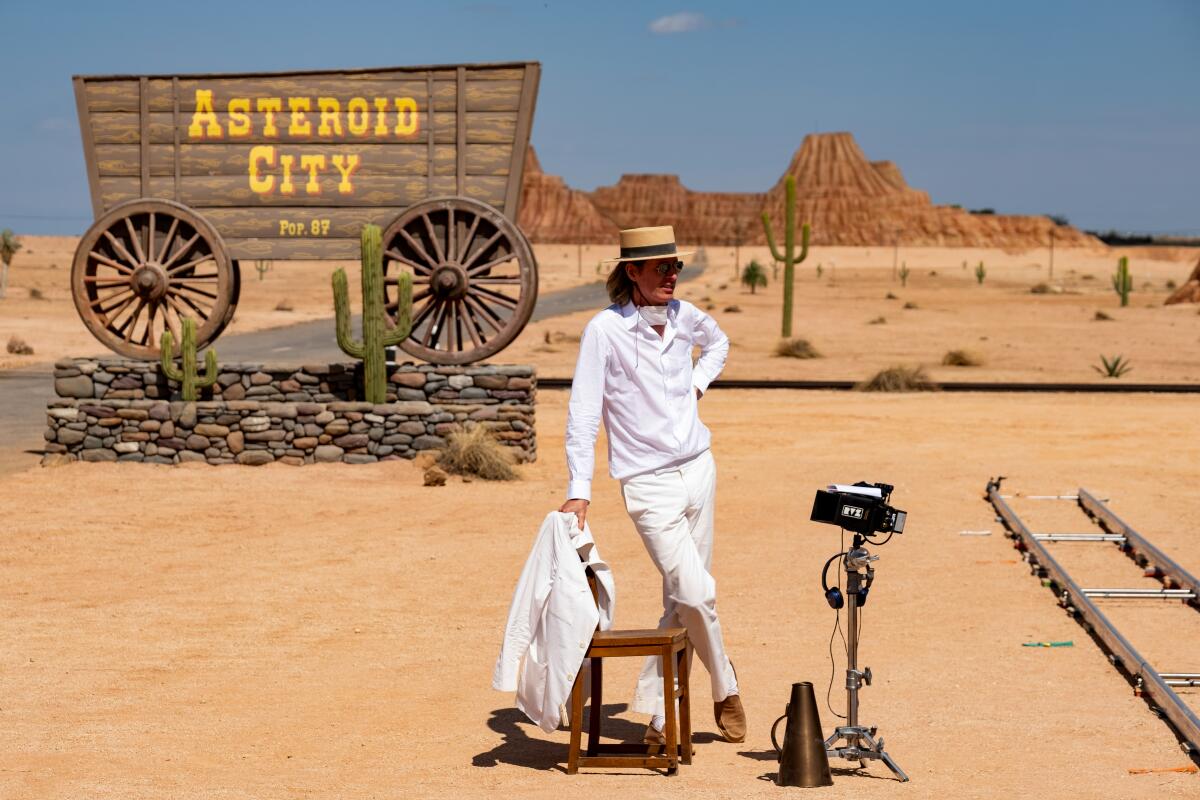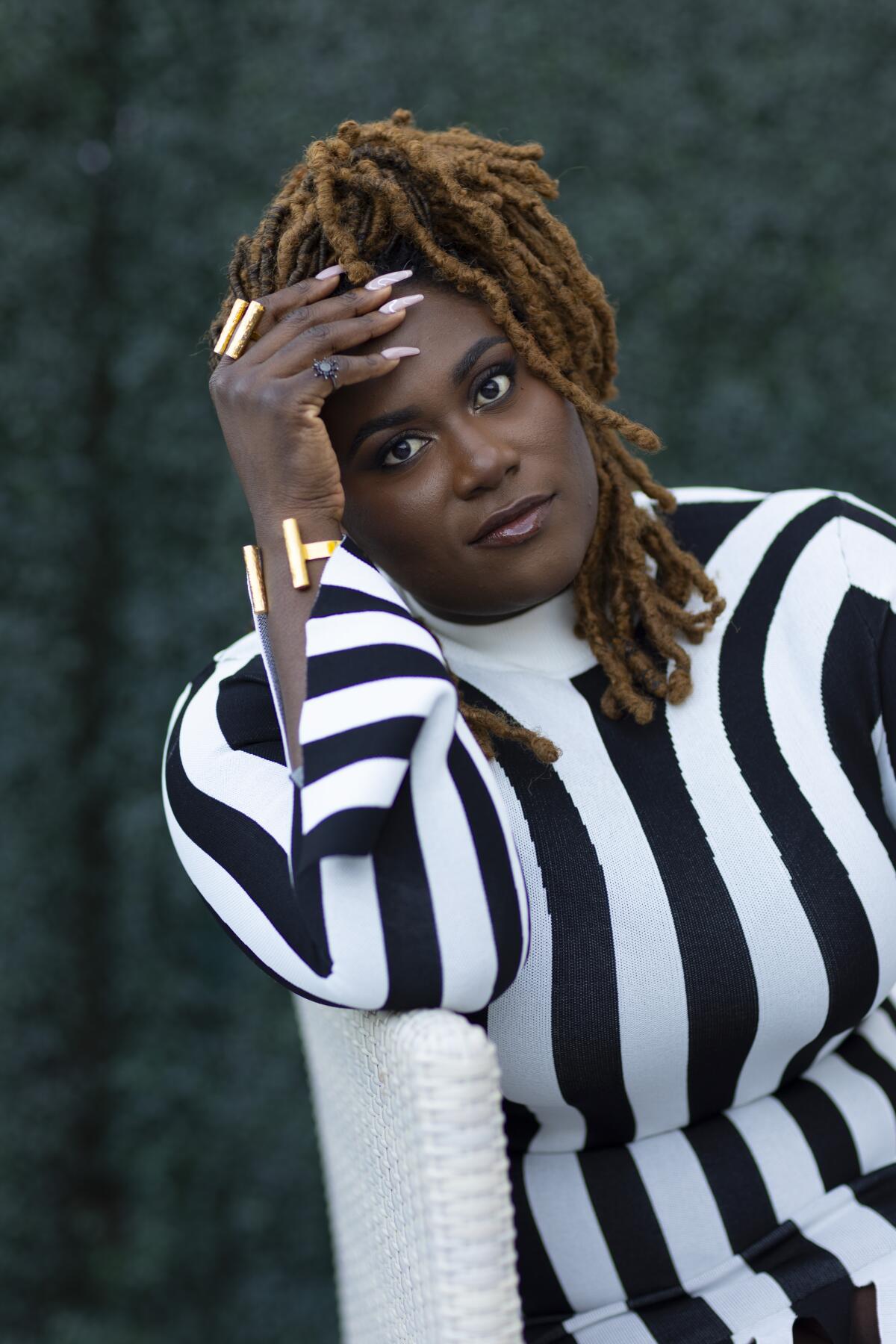What are you looking forward to in 2024?

- Share via
Greetings from the sunny (!) Pacific Northwest where I’m spending the holidays, avoiding that gloomy Southern California weather forecast and counting my blessings, even if no one gave me a brand-new Porsche for Christmas.
Sign up for The Envelope
Get exclusive awards season news, in-depth interviews and columnist Glenn Whipp’s must-read analysis straight to your inbox.
You may occasionally receive promotional content from the Los Angeles Times.
I’m Glenn Whipp, columnist for the Los Angeles Times and host of The Envelope’s Friday newsletter. Today’s missive is the final one from me for 2023. As ever, thanks to all of you for reading this year and for those emails, even the ones taking issue with my mixed feelings for the final season of “Ted Lasso.” Happy 2024!
Wes Anderson enjoyed a banner 2023
Wearing a seersucker suit and looking a tad terrified, Wes Anderson took the stage not long ago at the Venice Film Festival to accept the Cartier Glory to the Filmmaker Award, a prize, he said, that has a “biblical” ring to it. Anderson noted that a cursory glance at the award’s Wikipedia page revealed that many of the previous winners had received the honor at the premieres of some of their very worst movies.
“And I hope I’m not here to repeat that phenomenon,” Anderson said, noting that his Venice movie, an adaptation of the Roald Dahl story “The Wonderful Story of Henry Sugar,” was only 40 minutes long. “So as soon as it gets rolling, it’s almost over. And so maybe it’s 37 minutes left by the time you don’t like it — if you don’t like it.”
Nearly everyone liked it. Ingenious and arch — what else would you expect from Anderson? — “Henry Sugar” tells a tale of the transformation of its title character (Benedict Cumberbatch, delightful) from scoundrel to selflessness, making stops along the way in Calcutta and at Dahl’s own “writing hut.” (The author is played with a curmudgeonly zest by Ralph Fiennes.) It’s one of four short films Anderson recently made from Dahl stories. The others are “The Swan,” “The Rat Catcher” and “Poison,” and they’re all available on Netflix.
Anderson and I first met 13 years ago when I presented him an award for another Dahl adaptation, “The Fantastic Mr. Fox,” which had won the Los Angeles Film Critics Assn. honor for animated film. Neither of us touched our dinner before the presentation, and we bonded over our mutual terror.
“I won’t take even a sip of wine if there’s the possibility that I might have to give a speech,” Anderson says, calling the other day from his Paris home.
“The Golden Globes load up the table with wine,” I say ...
”... hoping you will stagger to the podium,” he says, finishing the thought. “You don’t want to feel too free on television.”
Between the four Dahl shorts and the feature-length “Asteroid City,” a moving meditation on nothing less than the mysteries and meaning of the cosmos, not to mention the joy that a dancing puppet roadrunner can elicit, Anderson has enjoyed a banner year. We dug into that during a recent conversation that also touched upon his next movie that he’ll begin shooting shortly, why it’ll include Michael Cera in a starring role and what he’d say to someone who didn’t respond to “Asteroid City” after seeing it. Give it a read. Anderson always makes for a terrific interview.

Who will be nominated for lead and supporting actress?
Have you ever been running late for something — work, school, a date, a 10K run — and found yourself completely at the mercy of forces outside your control?
Since many of you reading this live in Los Angeles, that’s something of a rhetorical question. The 405 remains undefeated. But it’s nothing really compared to what we see in “Full Time,” a frenetic French thriller about a single mother facing all manner of obstacles, thanks to a crippling transit strike, as she tries to get to her chambermaid job at a five-star Parisian hotel. Laure Calamy (“Call My Agent!”) stars and is so utterly convincing that you’ll need a six-pack of Valium after watching her barnstorm through her chaotic workweek.
“Full Time” had a brief theatrical run in February and can currently be streamed on Amazon Prime. At 88 minutes, it’s the perfect movie for anyone, like its heroine — like all of us — crunched for time.
I came across “Full Time” during some last-minute cramming before my annual vote as a member of the Los Angeles Film Critics Assn., a responsibility that produces its own share of anxiety because there is always one more movie to see, one more performance to check out and never enough time because, again, the 405 remains undefeated.
Academy voters are feeling that same crunch right now as nominations voting begins in a couple of weeks. I wrote a recent column taking a look at the races for lead and supporting actress, categories full of wonderful work from the likes of Emma Stone, Lily Gladstone, Danielle Brooks and Jodie Foster, all of whom I predict will go on to earn nominations.

Enjoying this newsletter? Consider subscribing to the Los Angeles Times
Your support helps us deliver the news that matters most. Become a subscriber.
Times classical music critic: ‘Maestro’ misses essence of Lenny
“Maestro,” a biopic about conductor Leonard Bernstein that centers its story on his complicated marriage to Felicia Montealegre, landed on Netflix over the holidays. Have you seen it yet? I’m curious to hear your thoughts on this passion project from Bradley Cooper, who plays Bernstein and directed and co-wrote the film.
Times classical music critic Mark Swed offered an interesting perspective on the movie, as he was a classmate and close friend with Thomas Cothran, the man Bernstein began an affair with in 1971. Mark offers some additional background on their relationship and its importance, along with his thoughts on the film, which he at first calls “pretty good” and then circles back, writing that “one of the reasons why ‘Maestro’ comes across as pretty good, or maybe even a little better than that, is because it is not really about music.”
“But that isn’t what made Bernstein exceptional,” Mark writes. “It is everything else. The fact is Bernstein didn’t have all that much time for family. He was doing a thousand things. When home, moreover, he worked like crazy, composing, studying scores, reading and writing.”
Among my issues with “Maestro” is that it doesn’t offer much insight into the inner lives of either Bernstein or Montealegre. Cooper delivers some bravura sequences, including a lengthy, monumental scene of Bernstein conducting a performance of Mahler’s Second Symphony in England’s Ely Cathedral that ranked with anything I saw in a movie this year. But I didn’t learn much about Bernstein or his creative genius.
So, yes, pretty good. Pretty, pretty, pretty, pretty good.
Sorry. I’m just happy that a new season of “Curb Your Enthusiasm” is coming next year. What are you looking forward to in 2024? Hope it’s going to be a good one for you. Until next week ... next year ...

Feedback?
I’d love to hear from you. Email me at glenn.whipp@latimes.com.
Can’t get enough about awards season? Follow me at @glennwhipp on Twitter.
Sign up for The Envelope
Get exclusive awards season news, in-depth interviews and columnist Glenn Whipp’s must-read analysis straight to your inbox.
You may occasionally receive promotional content from the Los Angeles Times.




